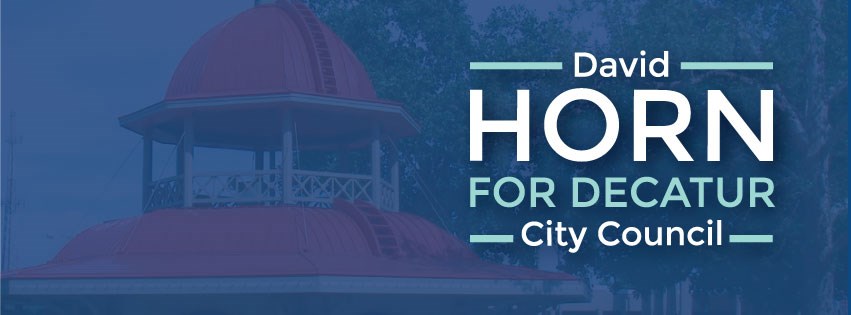
Eliminating the residency requirement and property tax levy on agenda for next Decatur City Council meeting
The next Decatur City Council meeting will take place on Monday, September 20 at 5:30 PM and will include 16 agenda items. Among the items to be discussed and/or voted on is the elimination of the residency requirement for employees (with the exception of department heads and above) and next year’s property tax levy.
RESIDENCY REQUIREMENT LIKELY TO BE ELIMINATED
In 2016, the city council passed a resolution that all persons employed by the City of Decatur were required to maintain residence within the corporate limits of the city (subject to the provisions of collective bargaining agreements). At its next city council meeting, the city council will likely vote to eliminate the residency requirement.
There are many strong arguments for why we should have a residency requirement and for the vast majority of the past 4.5 years, I have been an ardent supporter of a residency requirement. My position changed when the city manager proposed and most of the city council approved outsourcing public works positions to an out-of-town-engineering firm last September. Among the cited reasons for the outsourcing was that the residency requirement was a barrier to filling open city positions.
The outsourcing arrangement is extremely costly to city taxpayers and is not as efficient as having full-time employees. Between the September 8, 2020 agreement and the May 3, 2021 agreement with the out-of-town firm, the city has committed $272,422 for 2,199 hours of work (1,523 hours + 676 hours) at a cost of $123.88 per hour.
Rather than outsourcing, the city should have hired the staff it needed last year. For a similar dollar amount the city could fill two Engineering Tech I positions ($76,867 total compensation) and a City Engineer position ($120,516 total compensation) for $274,250 for 5,352 hours of work (assuming employee has 25 vacation days and 12 sick days per year and a 40-hour work week).
One of the current challenges to filling city positions is the residency requirement, and for this reason I am supportive of removing it. Furthermore, with the city having only 424 of its 451 full-time equivalent employees on staff (6% fewer than budgeted), city services are not as effective as they could be at full-staffing levels. Notwithstanding the above, I have and will encourage all Decatur employees to live in our city.
DISCUSSION OF PROPERTY TAX LEVY
The city council will be discussing the property tax levy in advance of a public hearing and final vote that will take place in late fall. The 2020 tax levy ordinance allocated $14.5 million to five areas: fire pensions - $5.3 million (36%), police pensions – $4.9 million (34%), public library – $2.9 million (20%), long-term debt payments - $1.3 million (9%), and the municipal band - $65,000 (<1%). There are three options for the property tax levy the council will be discussing: 1) levying the same dollar amount as last year, 2) maintaining the same property tax rate as last year, and 3) increasing the property tax rate such that property taxes cover 100% of the five obligations listed above. At this time, I continue to support maintaining the same property tax rate as last year.
As background, for the past two years, the city council has approved a property tax levy rate that is flat (option 2 above). Thus, provided that the equalized assessed value of one’s property is unchanged, property taxes owed to the city will remain the same (note: property taxes paid to the city are 16% of a property owner’s total bill). If this option is selected again it will result in the general fund having to cover any excess obligations not covered by property taxes. For example, the council approved a 2021 budget projected to spend $1 million in general fund monies for obligations not covered by property taxes.
While public safety pensions obligations are expected to increase property tax obligations $750,000 and debt service changes are expected to increase property tax obligations $714,000 next year (for total obligations of $15.9 million in 2021 compared to $14.5 million in 2020), it is also reasonable to assume that property values will increase in the short-term as a result of the significant demand for housing and in the medium-term as revitalization of neighborhoods in distressed areas takes place (although admittedly the city lacks a comprehensive neighborhood revitalization plan that would make this scenario more likely).
PLEASE EXPRESS YOUR VIEWS AT THE NEXT CITY COUNCIL MEETING
Meetings take place in the council chambers located on the third floor of the Decatur Civic Center (1 Gary K. Anderson Place). Free parking is available in the lot immediately south of the entrance. Citizens are encouraged to attend meetings and express their views. Citizens are allotted 3 minutes per person near the beginning of each city council meeting. In addition, citizens can provide comments regarding one regular agenda item per meeting for up to three minutes provided they notify the city in advance (and prior to the start of the meeting). You can request to speak on a particular agenda item at a council meeting by filling out an on-line form at: https://www.decaturil.gov/mayor-and-council/advance-request-to-speak-at-council-meeting/.
CITIZENS ARE ENCOURAGED TO PROVIDE FEEDBACK TO CITY COUNCIL MEMBERS
If you would like to discuss city issues with a council member, phone numbers and email addresses for each council member can be found at the following link: https://www.decaturil.gov/mayor-and-council/council/.
AGENDAS FOR CITY COUNCIL MEETINGS ARE AVAILABLE ONLINE
An agenda and information about each agenda item for each city council meeting can be found at: https://www.decaturil.gov/mayor-and-council/council-meetings/.
